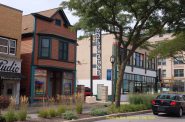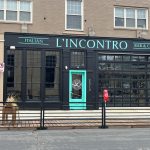How to Fill Those Empty Storefronts
Inaugural event will bring national leaders to Milwaukee to discuss long-term solutions for commercial corridors with empty storefronts.
Empty storefronts exist in virtually every commercial corridor in Milwaukee. Whether it’s N. Downer Ave. on the East Side or the S. Cesar Chavez Dr. on the South Side, you’ll find empty storefronts and local leaders looking for ways to fill them. It’s not a problem unique to Milwaukee, but it’s one that will get increasing attention as cities continues to gain more residents and businesses.
Two local organizations have teamed up to create the Empty Storefronts Conference focused on finding long-term uses for the vacant commercial spaces. NAIOP Wisconsin, the Wisconsin chapter of the Commercial Real Estate Development Association, and NEWaukee have set up the one-day conference for June 1st to look at what’s working and what isn’t. (Urban Milwaukee is a sponsor of the conference.)
Unlike virtually any other Milwaukee conference, the event will take place all across the city. The central hub will be in the Grand Avenue Mall’s Plankinton Arcade building. But after a two-hour morning session, attendees will branch out across the city. Staying true to the conference’s name, they’ll end up attending sessions in empty storefronts in such city neighborhoods as Avenues West, Silver City, The Brewery, Sunset Heights and Clarke Square.
NEWaukee sees the conference as taking the next step in their efforts. The social architecture organization has worked on a number of successful events that have promoted temporary uses for places, perhaps most visibly the W. Wisconsin Ave. Night Market. Jeremy Fojut of NEWaukee says the organization often hears people say, “wouldn’t it be great if these programs could fill the vacancies long term?” Fojut hopes this conference will provide an answer, that the event will identify solutions “to revitalize neighborhoods and recharge empty storefronts with new life.”
NEWaukee is no stranger to empty storefronts. When the co-founders made the company their full-time pursuit they opened their offices in one. In the lower level of the Shops of Grand Avenue, the company is an unconventional user of a couple thousand square-feet of otherwise empty space. They’re one of the last remaining Grand Avenue Mall tenants from the unfortunately discontinued Creativity Works Here program that bought “creative class” firms to empty retail spaces in the struggling mall.
Full-day tickets for the conference are $110 and half-day tickets are available for $60. To purchase tickets or find more information about the conference, please visit www.emptystorefronts.com
Empty Storefronts
-
The Goldmann’s Sign Returns
 Jul 10th, 2019 by Jeramey Jannene
Jul 10th, 2019 by Jeramey Jannene
-
Meet Emily Robbins
 May 29th, 2015 by Jeramey Jannene
May 29th, 2015 by Jeramey Jannene
-
Meet June Williamson
 May 29th, 2015 by Jeramey Jannene
May 29th, 2015 by Jeramey Jannene


















Is this not simply a matter of these spaces being overpriced?
Of course, rent can be a factor, but it’s also risky to set up shop in an area with many empty storefronts in an area that’s struggling.
Some say one Downer Avenue landord has charged too much for some rents and has lost potential tenants. This is a prime established location with way too many empty spaces.
Can the city do incentives to help?
I lived and worked downtown from the late 70s (Chapmans, Gimbels, Boston Store even J.C. Penny) through the creation of the Grand Ave. Mall. It was being transferred westward-ho! to an I-94 off-ramp office park that lowered the quality of daily life for me and I was just one of 3 shifts that were transferred at that time: no more daily lunch runs, shopping, etc. — stuck in a suburban lunch room for breaks.
I eventually volunteered for a less-than-desirable project to get back downtown to bring my quality of life back to what it had been.
Bes way to fill storefronts is a buy local and shop local movement. Being smarter means creating work for Milwaukeeans, and selling the products here. Subsidized rent until a business gets stabilized (usually 18 months for retail) would let businesses get off the ground before they go under. I suggest for example local high school logos on what used to be called lettermen sweaters, made locally, similarly for colleges and universities… Support local artists with card designs, Milwaukee landmarks and prints, food truck type lunchhour venues that have drivethroughs for people going home in the evening, too. And a buy black movement would help fill storefronts throughout the inner city. Do you know that if we/they spend about 17% of their money locally from small shops, it would fill up all the storefronts. Quit Walmart, etc…. Quit buying junk, even if it is cheap.
It feels pretty awkward to see an issue — empty storefronts, urban blight, areas that need attention and resources — and then charge people $110 to convene to discuss the problem.
This will price out some of the residents in these areas — the prime stakeholders and likely the folks who hold the key to ideas that will be best received and work best.
As a matter of fact, if NEWaukee depends on attendees for creative problem-solving and good ideas to address these concerns, shouldn’t they be paying them for their time and talent?
Just shaking my head about all of this….
Herhonor: Your subsidized rent suggestion makes a lot of sense, especially where there are multiple empty storefronts. Does the city currently do this at all? Small businesses need incentives just as much as big ones, often more.
Agree about supporting local businesses.